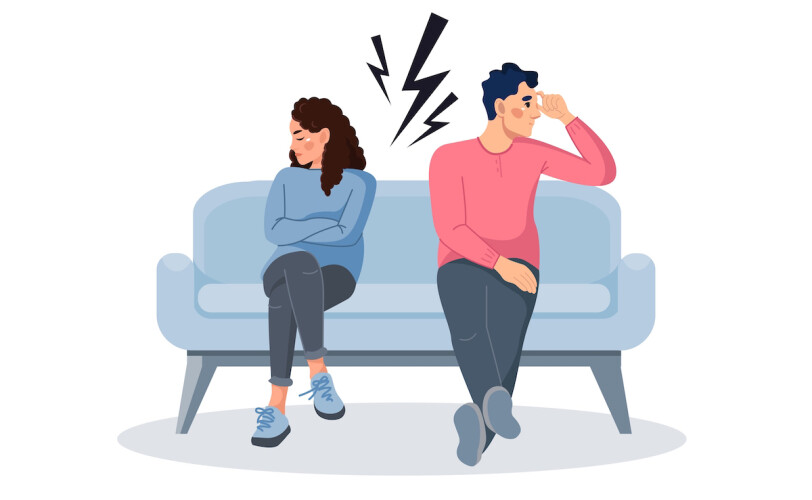Maintaining a healthy and happy relationship can be a challenging endeavor. Even the most loving couples can face issues and conflicts that may strain their bond. In such situations, couples therapy can be a valuable resource to help couples navigate these challenges, improve communication, and strengthen their relationship. If you’re looking for couples therapy near you, this blog will guide you through the process of finding the right therapist and understanding the benefits of couples therapy.
Contents
Benefits of Couples Therapy

Couples therapy, also known as marriage or relationship counseling, offers numerous benefits for couples who are facing challenges or seeking to improve their relationship. Here are some of the key benefits of couples therapy:
Improved Communication: Effective communication is vital for any healthy relationship. Couples therapy provides a safe space for partners to learn and practice better communication skills. This includes active listening, expressing thoughts and feelings clearly, and understanding each other’s perspectives.
Conflict Resolution: Couples often face conflicts, but therapy can teach them how to navigate these disagreements constructively. Partners can learn to address issues without hostility, blame, or escalation, leading to more productive resolutions.
Enhanced Intimacy: Therapy can help couples rebuild emotional and physical intimacy. By addressing underlying issues, improving communication, and exploring each other’s needs and desires, couples can experience a deeper and more satisfying connection.
Strengthened Emotional Bond: Couples therapy can strengthen the emotional bond between partners. Through open and honest dialogue, couples can gain a better understanding of each other’s emotions, needs, and vulnerabilities, fostering a closer connection.
Increased Self-Awareness: Therapy encourages both partners to reflect on their behaviors, emotions, and patterns within the relationship. This self-awareness can lead to personal growth and a better understanding of how individual issues may impact the relationship.
Types of Couples Therapy
Couples therapy encompasses a variety of therapeutic approaches and techniques designed to address different issues within relationships. The choice of a specific type of couples therapy often depends on the unique needs and challenges of the couple. Here are some of the most common types of couples therapy:
- Cognitive-Behavioral Therapy (CBT): CBT focuses on identifying and changing negative thought patterns and behaviors that contribute to relationship problems. Couples learn to recognize and modify harmful cognitive patterns, leading to improved communication and problem-solving skills.
- Emotionally Focused Therapy (EFT): EFT is based on the idea that emotions are at the core of relationship problems. Therapists using EFT help couples identify and express their emotions, facilitating a stronger emotional bond and better communication.
- Imago Relationship Therapy: This therapy emphasizes the idea that people are drawn to partners who represent aspects of their caregivers from childhood. Imago therapy aims to heal past wounds by helping partners understand and empathize with each other’s childhood experiences.
- Gottman Method: Developed by Dr. John Gottman, this approach focuses on strengthening relationships by improving communication, resolving conflicts, and enhancing intimacy. The method is research-based and includes various assessment tools.
- Narrative Therapy: Narrative therapy encourages couples to explore the stories they tell themselves about their relationship. By reframing these narratives and viewing their problems from different perspectives, couples can gain insight and create new, more positive stories.
- Solution-Focused Brief Therapy (SFBT): SFBT is a short-term, goal-oriented approach that focuses on finding solutions rather than dwelling on problems. Couples identify their strengths and develop strategies to achieve their desired outcomes.
- Behavioral Couples Therapy: This approach uses principles of behaviorism to target specific behaviors within the relationship. It often involves setting goals, creating rewards, and using reinforcement techniques to promote positive changes.
- Integrative Couples Therapy: Integrative therapists draw from multiple therapeutic approaches and techniques to tailor treatment to the unique needs of each couple. This flexibility allows therapists to address a wide range of issues effectively.
Choosing the Right Couples Therapist

Choosing the right couples therapist is a crucial step in the process of seeking help for your relationship. The therapist you select can greatly influence the effectiveness of the therapy. Here are some key factors to consider when choosing a couples therapist:
Credentials and Qualifications:
- Look for therapists who are licensed and have relevant credentials in marriage and family therapy, clinical psychology, counseling, or a related field.
Specialization and Experience:
- Seek a therapist who specializes in couples therapy. Experience in this specific area is essential because couples therapy can differ significantly from individual therapy.
- Inquire about the therapist’s experience with issues similar to yours, such as communication problems, infidelity, or parenting conflicts.
Approach and Methodology:
- Different therapists use various therapeutic approaches, such as Cognitive-Behavioral Therapy (CBT), Emotionally Focused Therapy (EFT), or the Gottman Method. Ask potential therapists about their approach and how it aligns with your needs and preferences.
- Discuss the therapist’s treatment plan and goals for your relationship.
Compatibility and Comfort:
- The therapeutic relationship is crucial, so it’s essential that you and your partner feel comfortable with the therapist. Trust your instincts; if you don’t feel a connection, it may be best to continue your search.
- Consider whether the therapist is culturally sensitive and open-minded, as these qualities can foster a more inclusive and respectful therapeutic environment.
Availability and Scheduling:
- Determine the therapist’s availability and office hours to ensure they can accommodate your schedules.
- Ask about their policy for rescheduling or canceling appointments.
Location and Accessibility:
- Choose a therapist whose office is conveniently located and easily accessible for both you and your partner.
- Consider whether in-person sessions are preferable or if you’re open to online therapy options.
Cost and Insurance:
- Discuss the therapist’s fees and payment policies. Some therapists offer sliding scale fees or accept insurance, so clarify the financial aspects of therapy.
- If you have insurance coverage, contact your provider to determine which therapists are in-network.
Reviews and Recommendations:
- Read online reviews and testimonials about the therapist. While these can provide insights, remember that personal experiences may vary.
- Seek recommendations from friends, family members, or healthcare professionals who have experience with couples therapy.
What to Expect in Couples Therapy Sessions

Couples therapy is a collaborative and confidential process designed to help couples improve their relationship, resolve conflicts, and achieve a healthier and more satisfying connection. If you’re considering couples therapy, it’s helpful to understand what to expect in therapy sessions. Here’s an overview of what typically happens during couples therapy:
Initial Assessment:
- The first session often involves an initial assessment where the therapist gathers information about the couple’s history, current challenges, and therapy goals.
- You and your partner will have an opportunity to share your perspectives on the issues you’re facing and what you hope to achieve through therapy.
Establishing Goals:
- The therapist will work with you and your partner to establish clear and specific therapy goals. These goals will guide the therapeutic process and provide a focus for your sessions.
Therapeutic Approach:
- The therapist will discuss their therapeutic approach and the methods they plan to use in therapy. Different therapists may use various techniques, such as communication exercises, role-playing, or homework assignments, depending on their approach.
Communication and Conflict Resolution:
- A significant portion of couples therapy focuses on improving communication and conflict-resolution skills.
- You’ll learn effective ways to express your thoughts and feelings, actively listen to your partner, and address conflicts in a more constructive and empathetic manner.
Exploration of Issues:
- The therapist will guide discussions to explore the underlying issues and dynamics that contribute to relationship challenges.
- You and your partner may be asked about your individual and shared experiences, expectations, and concerns.
Tips for a Successful Couples Therapy Journey

Embarking on a successful couples therapy journey can be a transformative experience for your relationship. Here are some tips to help you make the most of your time in therapy and work towards a healthier and happier partnership:
- Open and Honest Communication: Practice open and honest communication both inside and outside of therapy. Share your thoughts, feelings, and concerns with your partner, and encourage them to do the same. Effective communication is essential for making progress in therapy.
- Set Clear Goals: Establish clear and specific therapy goals with your partner. Identifying what you want to achieve in therapy can provide a roadmap for your sessions and help you stay focused on your objectives.
- Commitment and Consistency: Commit to attending therapy sessions regularly and consistently. Consistency is key to building momentum and seeing progress in your relationship. Make therapy a priority.
- Keep an Open Mind: Approach therapy with an open mind and a willingness to explore new perspectives and solutions. Be open to change and growth, even if it challenges your preconceived notions.
- Take Responsibility: Recognize your role in the relationship dynamics and issues. Taking responsibility for your thoughts, actions, and contributions to the challenges can be empowering and lead to positive change.
- Practice Patience: Change and progress in therapy may not happen overnight. Be patient with yourself, your partner, and the therapeutic process. Healing and growth take time.
- Follow Through on Homework: If your therapist assigns homework or exercises between sessions, make an effort to complete them. These assignments are designed to reinforce what you’ve learned in therapy and apply it in real-life situations.
Conclusion
Couples therapy can be a transformative journey that strengthens the bonds between partners and fosters a healthier, happier relationship. Whether you opt for traditional in-person therapy or the convenience of online sessions, the benefits are substantial. By committing to open communication, patience, and implementing what you learn, you can embark on a path toward a more fulfilling and harmonious relationship.
If you are looking for an affordable Online Therapy TherapyMantra can help: Book a trial Online therapy session.


